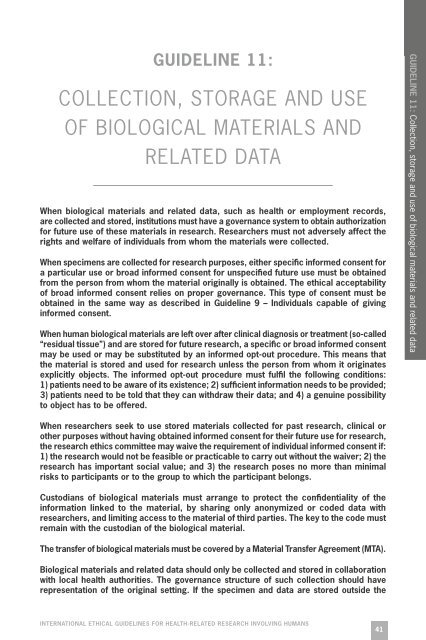International Ethical Guidelines for Health-related Research Involving Humans
WEB-CIOMS-EthicalGuidelines
WEB-CIOMS-EthicalGuidelines
Create successful ePaper yourself
Turn your PDF publications into a flip-book with our unique Google optimized e-Paper software.
GUIDELINE 11:<br />
COLLECTION, STORAGE AND USE<br />
OF BIOLOGICAL MATERIALS AND<br />
RELATED DATA<br />
When biological materials and <strong>related</strong> data, such as health or employment records,<br />
are collected and stored, institutions must have a governance system to obtain authorization<br />
<strong>for</strong> future use of these materials in research. <strong>Research</strong>ers must not adversely affect the<br />
rights and welfare of individuals from whom the materials were collected.<br />
When specimens are collected <strong>for</strong> research purposes, either specific in<strong>for</strong>med consent <strong>for</strong><br />
a particular use or broad in<strong>for</strong>med consent <strong>for</strong> unspecified future use must be obtained<br />
from the person from whom the material originally is obtained. The ethical acceptability<br />
of broad in<strong>for</strong>med consent relies on proper governance. This type of consent must be<br />
obtained in the same way as described in Guideline 9 – Individuals capable of giving<br />
in<strong>for</strong>med consent.<br />
When human biological materials are left over after clinical diagnosis or treatment (so‐called<br />
“residual tissue”) and are stored <strong>for</strong> future research, a specific or broad in<strong>for</strong>med consent<br />
may be used or may be substituted by an in<strong>for</strong>med opt-out procedure. This means that<br />
the material is stored and used <strong>for</strong> research unless the person from whom it originates<br />
explicitly objects. The in<strong>for</strong>med opt-out procedure must fulfil the following conditions:<br />
1) patients need to be aware of its existence; 2) sufficient in<strong>for</strong>mation needs to be provided;<br />
3) patients need to be told that they can withdraw their data; and 4) a genuine possibility<br />
to object has to be offered.<br />
Guideline 11: Collection, storage and use of biological materials and <strong>related</strong> data<br />
When researchers seek to use stored materials collected <strong>for</strong> past research, clinical or<br />
other purposes without having obtained in<strong>for</strong>med consent <strong>for</strong> their future use <strong>for</strong> research,<br />
the research ethics committee may waive the requirement of individual in<strong>for</strong>med consent if:<br />
1) the research would not be feasible or practicable to carry out without the waiver; 2) the<br />
research has important social value; and 3) the research poses no more than minimal<br />
risks to participants or to the group to which the participant belongs.<br />
Custodians of biological materials must arrange to protect the confidentiality of the<br />
in<strong>for</strong>mation linked to the material, by sharing only anonymized or coded data with<br />
researchers, and limiting access to the material of third parties. The key to the code must<br />
remain with the custodian of the biological material.<br />
The transfer of biological materials must be covered by a Material Transfer Agreement (MTA).<br />
Biological materials and <strong>related</strong> data should only be collected and stored in collaboration<br />
with local health authorities. The governance structure of such collection should have<br />
representation of the original setting. If the specimen and data are stored outside the<br />
INTERNATIONAL ETHICAL GUIDELINES FOR HEALTH-RELATED RESEARCH INVOLVING HUMANS<br />
41


